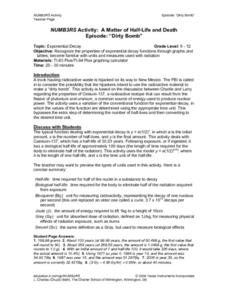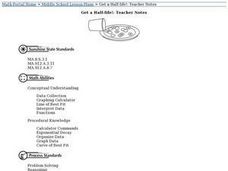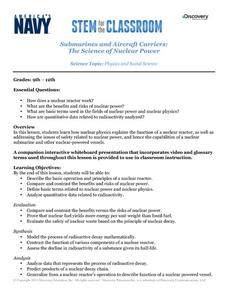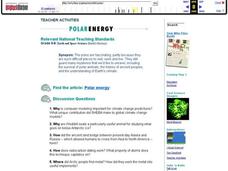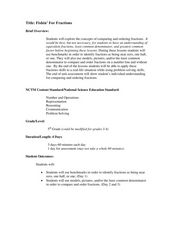Kenan Fellows
Half-Life
Scholars shake their way to understanding half-life with the help of candy. They observe and record which side candy lands on to graph the exponential decay in the fifth lesson of seven integrating chemistry and algebra. Combining...
Virginia Department of Education
Radioactive Decay and Half-Life
Explain the importance of radioactive half-life as your high school biologists demonstrate the concept by performing a series of steps designed to simulate radioactive decay. Pupils use pennies to perform an experiment and gather data....
Curated OER
Teaching Radioactive Decay: Radioactive Half-life And Dating Techniques
Learners generate a radioactive decay table for an imaginary element using a box filled with pinto beans and M&M's. They use their data to plot a decay graph, develop the concept of half-life, and use the graph to "age" several samples.
Curated OER
Get a Half-life!
Students explore decay functions and the half-life of a substance. Through an M&M activity with calculators, students collect and graph data. They determine the linear, quadratic and exponential functions of the graph. Students...
Curated OER
Half Life Lab
Seventh graders model radioactive decay using pennies, collect data from their model, apply scientific visualization techniques to their data and create animated models explaining the concept of radioactive half-life.
Curated OER
NUMB3RS Activity: A Matter of Half-Life and Death
Students investigate exponential decay. Students explore the biological half-life of Cesium-137. Students investigate the Goiania Accident of 1987 which is considered one of the worst incidents in the history of the Atomic...
Curated OER
Get a Half Life!
Eighth graders use M&M's to experiment with data. They use a graphing calculator to determine the best equation for their data; linear, quadratic or exponential. They analyze the data to find the half-life of their M&M's.
Curated OER
Fractions - Equal or Not
A fabulous instructional activity on fractions awaits your young mathematicians. In it, learners are invited to explore the world of fractions by accessing websites that have educational activities and worksheets embedded in them. Some...
Curated OER
Get a Half-Life!: Student Worksheet
In this math/science worksheet, students will work in pairs to conduct an experiment based on a decay function which is often used to model radioactive decay. Students will shake M & M's in a cup to rub off the M and then record...
Curated OER
Half Lives
Students investigate the concept of half-life by conducting an M&M experiment. In this chemistry instructional activity, students differentiate nuclear fusion and fission. They present investigation findings to class.
Curated OER
Radioactive Decay and Half-Life
Learners describe how the mass of a radioactive isotope changes with time and the factors that affect the rate of radioactive decay. They write nuclear decay equations to represent natural transmutation. This activity is accomplished...
Virginia Department of Education
Isotopes
Lead your class through the amazing world of isotopes as they investigate the various properties they contain and further understand their respective location on the periodic table. They explore half-lives and radioactivity as each...
Discovery Education
Submarines and Aircraft Carriers: The Science of Nuclear Power
As physics masters view this presentation, they learn how nuclear power is used in submarines. They use Google Maps to plot a course through the ocean and calculate the time required for surfacing and traveling. They learn about fission,...
Curated OER
Carbon 14 Dating
Evaluating and analyzing exponential functions will help your archaeologists find the amount of Carbon 14 remaining in a plant in this real-life task centered on carbon dating. Learners will also be introduced to the concept of half-life.
Curated OER
Carbon Dating
Simulate C-14 decay using M&M and Reese's Pieces candies. In this scatter-plot lesson, high schoolers perform an experiment to simulate the half life of C-14. Information is plotted on a scatter-plot. Students answer four...
Curated OER
Cellular Models
Each student construct a model of a cell on a large cookie, including the parts which were discussed during lecture.? Half of the class will be instructed to make plant cell models and the other half will be in charge of animal cell...
Curated OER
Polar Energy
Students define and read an article on polar energy. In this polar energy lesson, students answer questions about the article. Students participate in activities related to isotopes, half-life and radiocarbon. Students...
Virginia Department of Education
Logarithmic Modeling
Explore logarithms and logarithmic regression. Young mathematicians first learn about inverse functions and about the logarithm function family. They take their newfound knowledge to use logarithmic functions to model situations and...
Curated OER
Radiation Reassessed
Learners investigate the dangers of radiation by exploring recent nuclear tragedies. In this scientific debate lesson, students define the idea of radiation "half life" and determine if low doses of radiation are truly damaging to...
Curated OER
Radioactive Decay/Half Life
Students demonstrate radioactive decay using candy corns. For this Physics lesson, students make predictions, collect data and form conclusions about patterns in radioactive decay.
Curated OER
Get a Half-life!
Students use m&m candies as their sample set. They begin by counting the total number of candies to determine their sample size. Students put the candies into a cup and shake them gently before pouring them onto a paper plate. Count...
Curated OER
Earth's Age: The Dating Game
Students conduct a simulation to determine radioactive decay and half-life. Using pennies, dice or sugar cubes as isotopes placed in shoe boxes simulating rocks, they hold five trials representing 1000 years each to find the theoretical...
Space Awareness
Oceans as a Heat Reservoir
Oceans absorb half of the carbon dioxide and 80 percent of the greenhouse gases released into the atmosphere. Scholars learn how and why the oceans store heat more effectively than land and how they help mitigate global warming. Pupils...
Curated OER
Fishin' For Fractions
Fifth graders compare fractions. In this fraction lesson, 5th graders identify whether a fraction is closest to zero, half, or one and use common denominators. They put fractions in order and complete real-life fraction questions.







